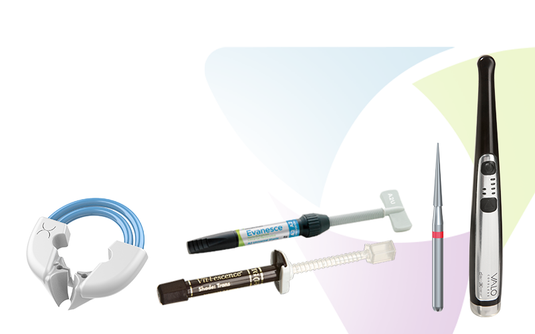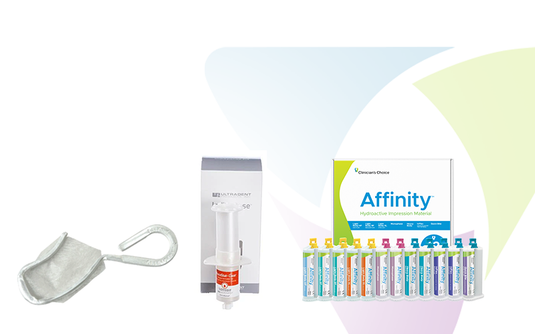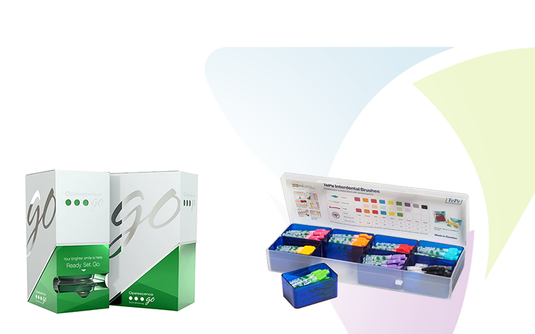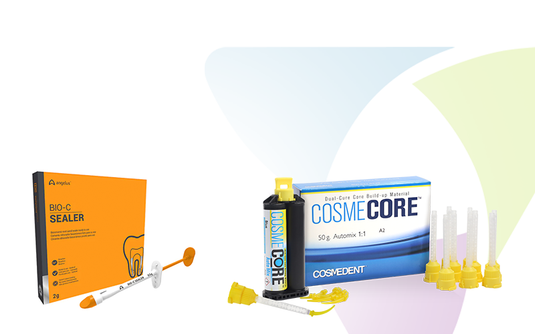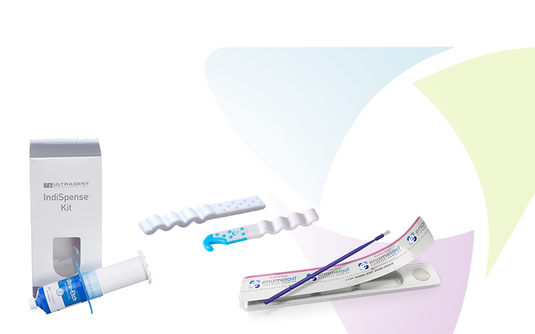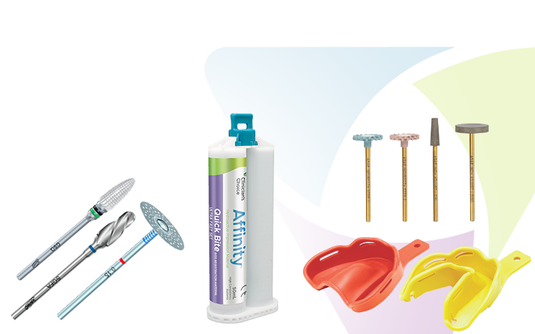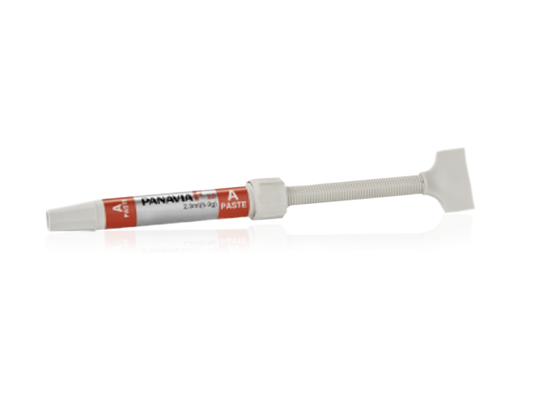
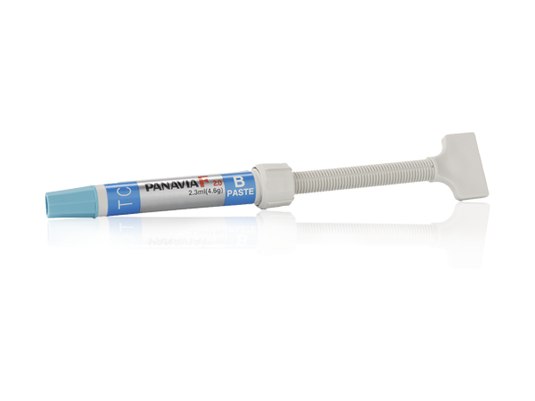
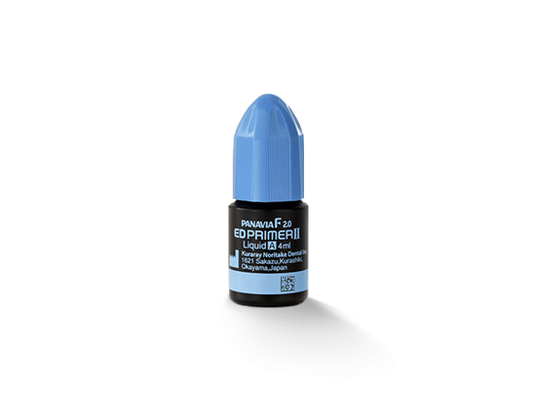
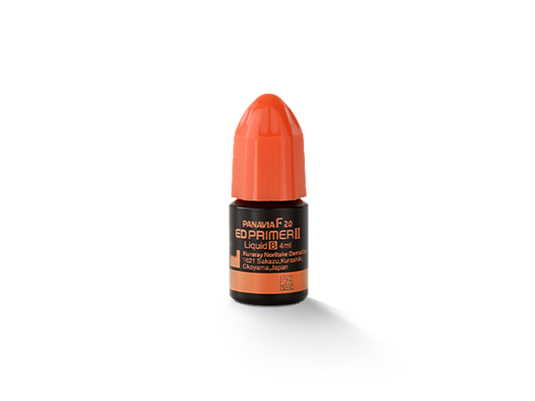
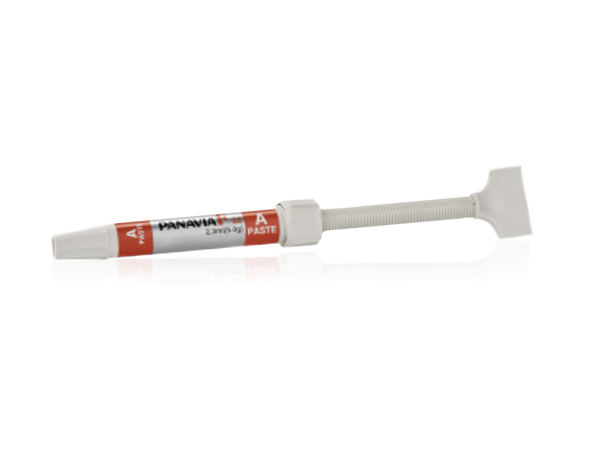
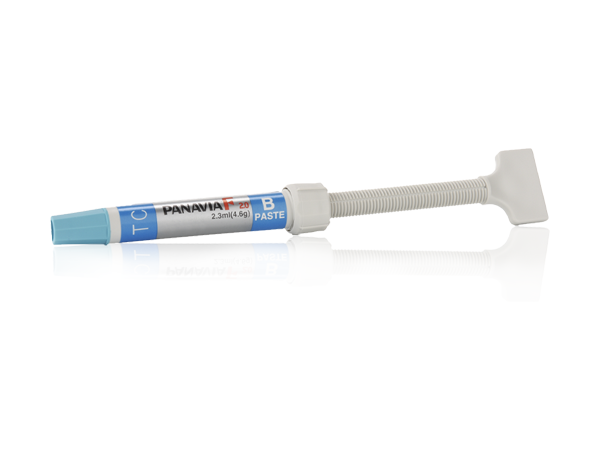
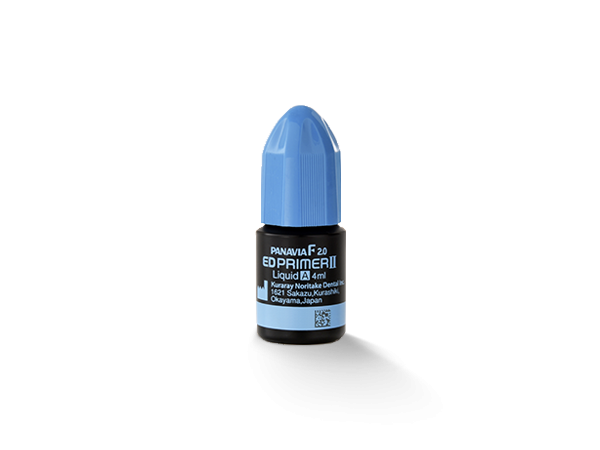
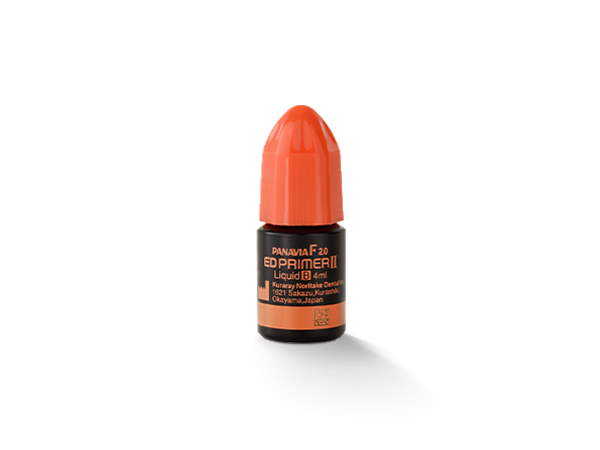
- Product Details
- Clinical Technique
- Technical Details
- Configurations
- FAQ
- Resources
- Accessories
Panavia™ F 2.0 is a dual-cure resin cement with anaerobic properties. Excess paste can be light-cured*. The cement which the light cannot reach is cured by its self-curing reaction in anaerobic conditions (with the exclusion of oxygen). Panavia F 2.0 is accepted as a premium product by leading universities, displaying a high bond strength to tooth structures and restoration materials. In combination with the self-etching primer system ED Primer II, the resin cement reduces post-operative sensitivity and provides consistently good results. Other features and benefits include:
- Ideal for any procedure with any curing light
- Legendary desensitizing
- Strongest bond to metal-oxide ceramics
- MDP self-adhesive monomer

*Although this is not stated in the Instructions for Use (IFU).
With Panavia F 2.0, a strong bond is obtained independent of the restorative material used. While most of the work steps are similar in every clinical procedure, conditioning of the restoration surface may be different for different materials.
-
Sandblast, ultrasonic clean and dry. If precious metal is used, apply Alloy Primer to its surface.

-
Apply K-Etchant Gel (40% phosphoric acid) to clean surface for 5 sec. Rinse and dry.

-
Apply Clearfil Ceramic Primer Plus to the internal surface of the restoration and dry.

-
Mix equal amounts of ED Primer II A + B and apply to the tooth. Then wait 30 sec.

-
Gently air dry.

-
Dispense equal amounts of paste A + B.

-
Mix paste A + B for 20 sec.

-
Apply the mixture of the paste to the sandblasted crown and place the crown.

-
Remove excess cement. (For easy clean-up, partially light-cure the excess cement for 2–5 sec. with conventional halogen or LED light, then remove the excess.)*

-
Light-cure the margins for 20 sec. per surface (conventional halogen or LED light) or 5 sec. per surface (Plasma arc or fast halogen light).

-
OR Self-cure material by applying OXYGUARD™ to the margins. Then wait for 3 min.

Panavia F 2.0 describes a whole cement system. This system consists of Panavia F 2.0 Pastes A and B, ED Primer II for conditioning of the tooth structure, Alloy Primer and Oxyguard II. The latter is used to prevent inhibition of oxygen at the margins during self-curing of the cement. For ceramic restorations, the use of Clearfil Ceramic Primer Plus is recommended*. The system is indicated for:
For all kinds of restorations

Cementation of metal crowns and bridges, inlays and onlays.

Cementation of porcelain crowns, inlays, onlays and veneers.

Cementation of composite resin crowns, inlays and onlays.

Cementation of adhesive bridges.

Cementation of endodontic cores and prefabricated posts.

Amalgam bonding.
Self-defined working time
The cement has anaerobic-curing properties. Hence, the product is well-suited even for the cementation of restorations which are difficult to place, as the working time is long enough. At the same time, users are not slowed down if less time is needed, as curing starts immediately after restoration placement. This unique feature and the smooth consistency make Panavia F 2.0 a popular aid in daily practice.
Favourable clinical integration
The self-etching ED Primer II offers a convenient one-step procedure for etching and priming. It penetrates gently and effectively enamel and dentin, so that the included adhesive monomer MDP can set to work. When Panavia F 2.0 contacts the dried primer surface, the paste polymerizes from the adhesion interface. This is due to the polymerization accelerators in ED Primer II. Polymerization stress at the adhesion interface is minimized. In consequence, optimal bond strength is ensured and the potential development of margin gaps is reduced. The result is a favourable clinical integration.

*Although this is not stated in the Instructions for Use (IFU).
Kuraray Panavia F 2.0 Primer II Liquid A (Item Number: 605491): 1 x 4 mL bottle
Kuraray Panavia F 2.0 Primer II Liquid B (605492): 1 x 4 mL bottle
Kuraray Panavia F 2.0 A paste (605493): 1 x 2.3 mL syringe
Kuraray Panavia F 2.0 B Tooth Colour paste (605494): 1 x 2.3 mL syringe
Kuraray Panavia F 2.0 B Light paste (605497): 1 x 2.3 mL syringe
Kuraray Panavia F 2.0 B Opaque paste (605496): 1 x 2.3 mL syringe
Q: What is the difference between Panavia F 2.0 and Panavia 21?
A: Panavia F 2.0 is a dual-cure, fluoride-releasing adhesive resin cement. Panavia 21 is self-cure and does not contain fluoride.
Q: How long does it take for Panavia F 2.0 to self-cure?
A: 3 minutes (in-vivo).
Q: What is the extra-oral working time of Panavia F 2.0?
A: Mixed Panavia F 2.0 paste will not set on the pad if it is thinly spread.
Q: What is the intra-oral working time of Panavia F 2.0?
A: 60 seconds. ED Primer II must be applied to the tooth and left for 30 seconds prior to cementation with Panavia F 2.0.
Q: Can I use my Plasma Arc (Xenon) and LED Curing Light with Panavia F 2.0?
A: Yes.
Q: What is the shelf-life of Panavia F 2.0??
A: 2 years. Refrigerate when not in use.
Q: How many applications are in a set of ED Primer II?
A: 200 – 400.
Q: What should I do if I froze my Panavia kit accidentally?
A: Unfortunately, the product will need to be discarded, as the ED Primer liquid will separate and will no longer be homogeneous.
Q: What is the difference between the Panavia F 2.0 Intro and Complete Kit?
A: The complete kit contains both Alloy Primer and Ceramic Primer.
Q: Can Clearfil SE Bond be used to bond amalgam?
A: No. When bonding amalgam, Clearfil Liner Bond 2V is recommended, or both types of Panavia.
Q: What is the best way to remove the excess cement from the margins?
A: Many dentists do a partial cure of the excess cement first, then remove it with an instrument. Please make sure not to cure it completely; otherwise, it can be difficult to remove (as all resin cements historically are).
Q: How far in advance can ED Primer II be mixed before application?
A: You can use ED Primer II for (5) minutes after mixing. After (5) minutes, the mixed ED Primer becomes more viscous and the bond strength to tooth structure is decreased.
Q: What shades of paste is Panavia F 2.0 available in?
A:
- TC= translucent A3
- Opaque= opaque A2 (slightly yellow)
- Light= translucent A2
- White= paper white (whiter than A1, more translucent than opaque)
Q: Is Alloy Primer included in either the Panavia 21 or Panavia F 2.0 kits?
A: This is the answer to the question asked above.
Q: Is Clearfil Ceramic Primer included in either the Panavia 21 or Panavia F 2.0 kits?
A: Ceramic Primer is not available in the Panavia 21 kit or the Panavia F 2.0 Intro kit. It is available in the Panavia F 2.0 Complete kit.
Q: Can SE Bond be used to cement crowns?
A: No, it cannot be used to cement crowns.
Q: How do I prepare my base metal posts when using Panavia F 2.0?
A: Sandblast the post first, then wash and dry it. Panavia F 2.0 paste is self-adhering to all dental alloys. There is no need to treat the surface of the post; however, ED Primer II should be placed into the canal prior to cementation. The Panavia F 2.0 paste will be used to coat the post prior to insertion.
Q: What is the pH of ED Primer II?
A: Approximately 2.4.
Q: What is the filler loading for Panavia F 2.0 paste?
A: The filler loading for Panavia F 2.0 is 59 vol% and 78 wt%.
Q: How do I prepare porcelain when using Panavia F 2.0?
A: Sandblast the interior surface of the restoration; use etching gel to activate and clean the surface; apply a silane coupling agent (ex. Porcelain Bond Activator plus SE Bond Primer or Ceramic Primer) to the internal surface of the restoration. The Panavia F 2.0 paste is then applied directly to the restoration. ED Primer II is used to treat the tooth surface prior to cementation.
Q: How do I prepare my Procera and In-Ceram crowns when using Panavia F 2.0?
A: Sandblast the interior surface of the restoration; ultrasonic wash and then dry. Panavia F 2.0 bonds directly to high-strength ceramics (e.g. In-Ceram and Procera). Apply ED Primer II to the tooth surface prior to cementation. There is no need for etching or silanating the internal surface.
Q: Silane coupling agents are not recommended for use with high-strength ceramics. Why can Clearfil Ceramic Primer be used to treat Zirconia and Alumina restorations?
A: Clearfil Ceramic Primer contains the adhesion monomer included in Panavia resin cements (MDP) which bonds to metals, as well as high-strength ceramics (Zirconia & Alumina). MDP activates the silane, which makes it multi-use.
Q: Can the SE Bond Primer be used instead of ED Primer ll for Panavia F 2.0?
A: No. The composition of SE Bond primer is adjusted only for SE Bond. If it is used with Panavia F 2.0, performance will not be as good. SE Bond primer does not consist of the catalyst which is contained in ED Primer II for accelerating the cure of Panavia F 2.0.
Q: Does this acidity cause any clinical problems after the tooth is restored?
A: No. The pH of ED Primer II increases as it dissolves into the tooth, yet is neutralized by calcium ions. When composites and bonding agents polymerize they are inert; therefore, they do not cause pulpal irritation. Pain in the pulpal tissue occurs when the dentin is not completely sealed. It does not occur from a reaction to the composite or bonding agent.
Q: Is my ED Primer defective if it turns brown? Will it affect the bond strength?
A: If the ED Primer II is not expired and has been stored in the refrigerator, then there is no problem with the bond strength and curing time, even if the ED Primer’s colour becomes light brown. This colour change is due to the self-cure initiator.
Q: How do these shades translate to those on the Vita Shade Guide?
A:
- TC is close to a translucent A3;
- Opaque is a non-translucent, yellowish-white, closest to A2;
- Light is close to a translucent A2;
- EX/White is whiter than A1 (almost like the whiteness of paper).
Q: Can I use Liner Bond 2V primer with other bonding agents or resin cements?
A: No. Liner Bond 2V primer is formulated to work exclusively with the Liner Bond 2V system.
Product Information
View the Panavia F 2.0 Product Sheet.
View the Cementation of Indirect Restorations Technique Guide.
Technical Documents (English)
View the Panavia F 2.0 Alloy Primer SDS.
View the Clearfil Ceramic Primer SDS.
View the K-Etchant SDS. to view the
View the the Panavia F 2.0: ED Primer II Liquid A SDS.
View the Panavia F 2.0: ED Primer II Liquid B SDS.
View the Panavia F 2.0: Oxyguard II SDS
View the Panavia F 2.0: Paste A SDS.
View the Panavia F 2.0: Paste B SDS.
Technical Documents (French)
View the Panavia F 2.0 Alloy Primer SDS.
View the Clearfil Ceramic Primer SDS.
View theClick here to view the K-Etchant SDS.
View the Panavia F 2.0: ED Primer II Liquid A SDS.<
View the Panavia F 2.0: ED Primer II Liquid B SDS.
View the Panavia F 2.0: Oxyguard II SDS.
View the Panavia F 2.0: Paste A SDS.
View the Panavia F 2.0: Paste B SDS.
Recommended Kits: Kuraray Panavia F 2.0 Kits

